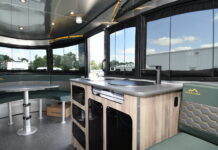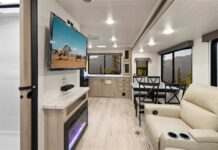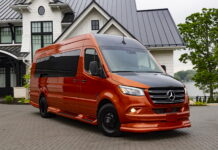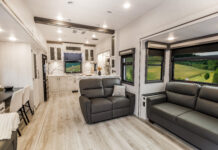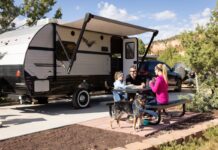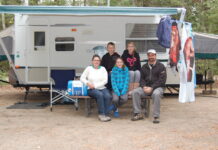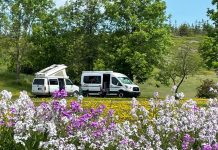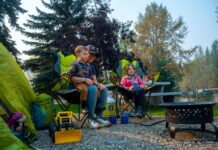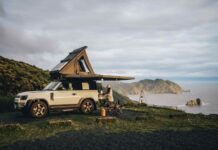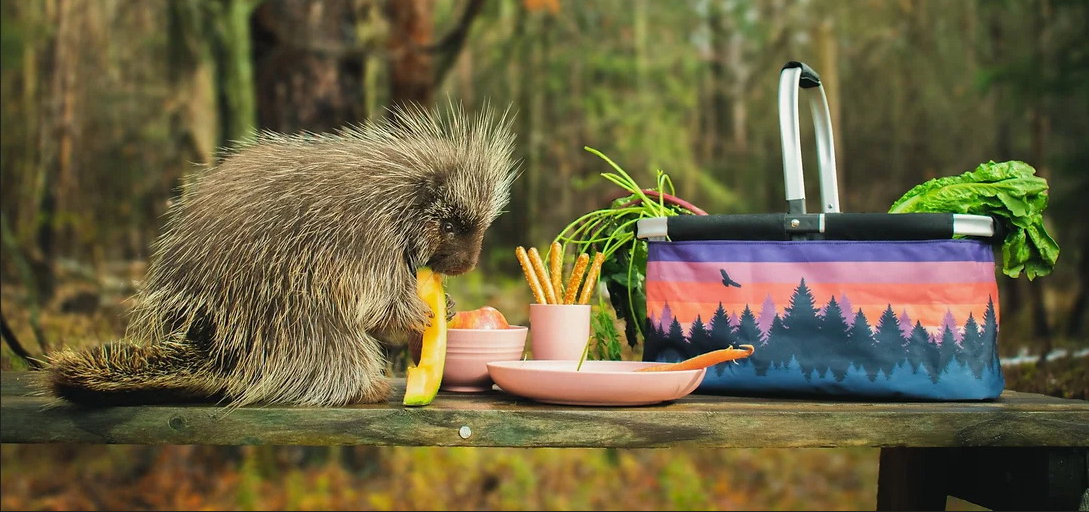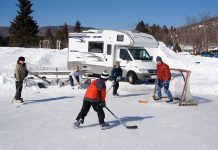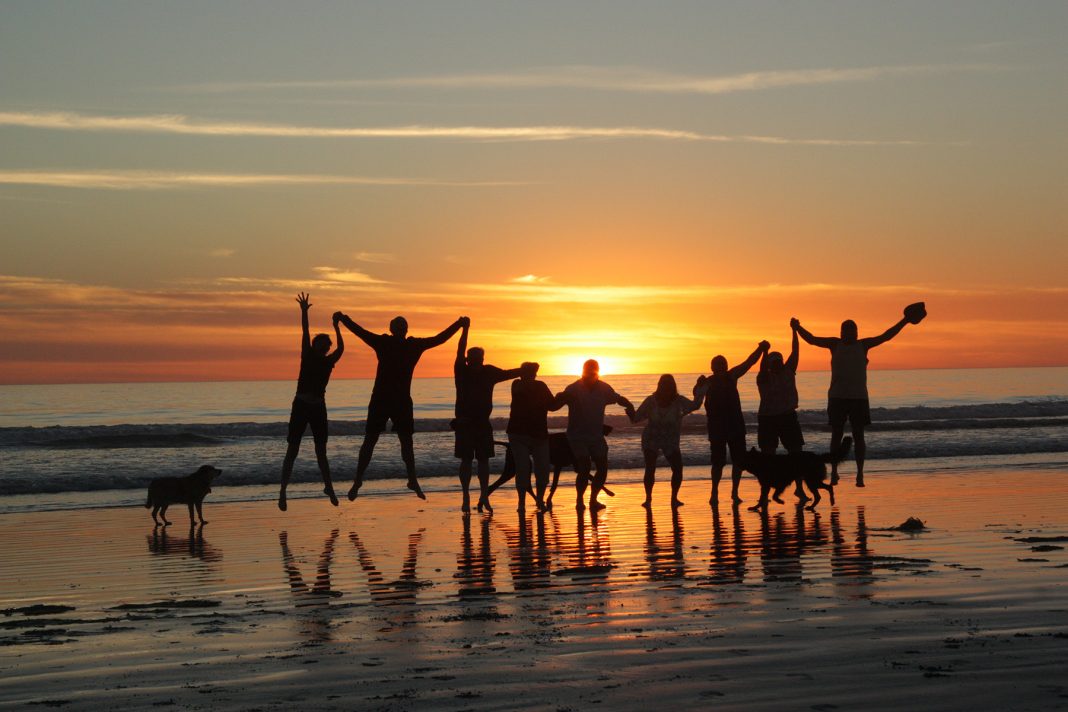Story by Dan and Lisa Goy
Photos from Maggie Dumbarton
Baja has always been Mexico’s frontier, not unlike the north in Canada. Even the Conquistador, Hernan Cortez, who first arrived on the Yucatan Peninsula and eventually conquered the Aztecs, never stepped on the Baja Peninsula until 1536. The two Baja States were the last to become proclaimed in the United Mexican States – Baja California in the north (1953), and Baja California Sur in the south (1974).
The Baja Peninsula states have twice as much coastline as their northern US sister known in Mexico as Alta California (State of California) with the Pacific Ocean on the west and Sea of Cortez on the east. The Mexican Federal Highway No. 1 (Hwy 1) was completed in 1973 and runs 1711 km (1061 miles) from the US Mexican Border to Cabo San Lucas. RV’ers have made this magnificent peninsula a snowbird destination since the highway opened, staying on beaches, RV parks, campgrounds and on the desert.
Is Baja Mexico Safe? What about the Banditos?
Sadly, we never seem to be able to talk about RV’ing in Baja without someone asking these questions. Not surprising given the significant negative media campaign about violence in Mexico over the past few years. The reality is that bad things happen everywhere in the world including Canada and the United States and these facts should not make us afraid to travel or leave our homes. We travel through the region on a regular basis, and we have never felt threatened or afraid.
Steeped in History
Mexico has a very colourful and interesting history, which makes it fascinating to explore. This country hosted many Pre-Columbian Mesoamerica cultures and advanced civilizations including Olmecs, Toltec, Teotihaucans, Maya, and Aztec. After 4,000 years, these civilizations were destroyed with the arrival of Hernan Cortez and Spain in 1519.
Several groups of indigenous people populated the Baja prior to the Spanish arriving and sadly the vast majority of the Baja Indians have disappeared. Those that have survived in the north are represented by as few as a dozen individuals or as many as a few hundred.
Preparing for your Visit
The most important preparation for a trip to Mexico begins in Canada. You must have a valid passport. Be sure to check the expiration date, you should not be travelling with a passport that will expire within 6 months. You must also have Mexican Vehicle Insurance, which can be purchased on-line through many companies. We buy ours at a discount through the Discover Baja Travel Club. https://www.discoverbaja.com/ This insurance must also be purchased for your towed vehicle if you have one.
What Should you Purchase Before you Go?
As with any RV trip outside of Canada, always buy extra health insurance.
Mexico has good medical facilities at very reasonable rates, but you should consider your travel through the States. We purchase our medical insurance through BCAA at good rates. MEDIPAC is also a great optional provider.
A good Baja camping book is also a must! We recommend “Baja Camping” by Mike & Teri Church. It is always good to have American dollars and Mexican pesos prior to entering Baja. We suggest purchasing some of each before you leave home. ATM’s for pesos are readily available throughout Baja and credit cards are usually accepted in larger centres.
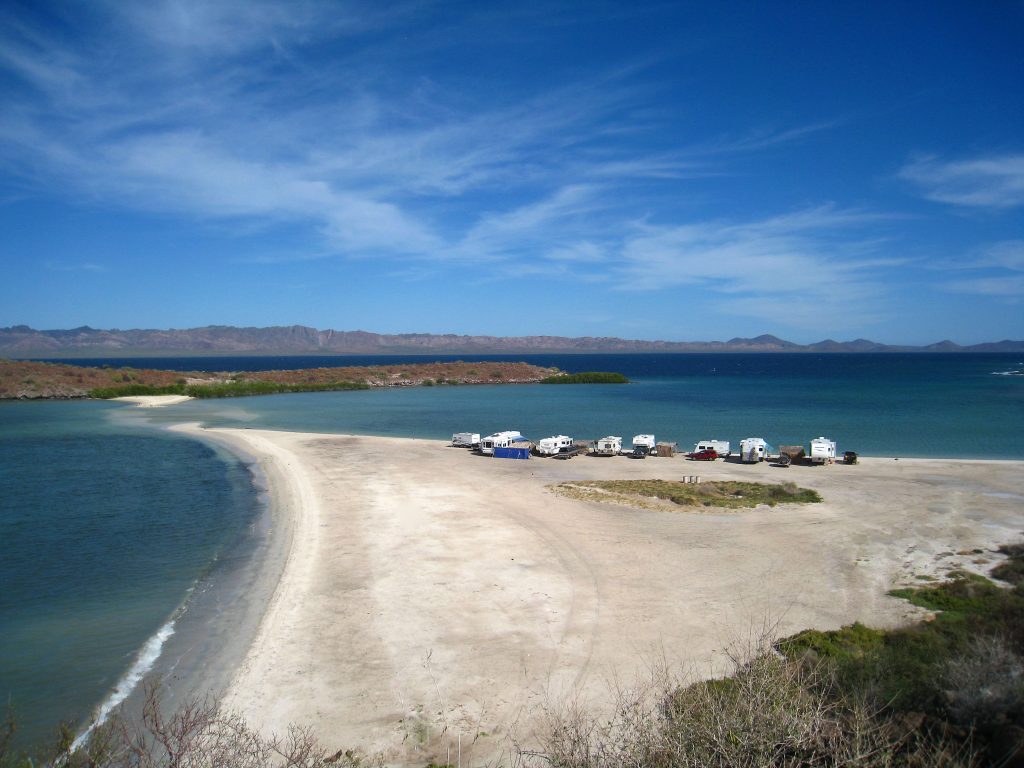 Where Should you Cross the Border into Baja?
Where Should you Cross the Border into Baja?
There are four main crossings into Baja, which include San Ysidro, Otay Mesa at Tijuana, Tecate and Mexicali. We usually cross just east of San Diego at Tecate and avoid the big city scene of TJ and Mexicali.
When you cross into Mexico this is a good time to get your Tourist Permit or Visa (FMM) which are obtained at the Immigration office. A small fee is then payable at the bank. You are then required to return to the immigration office to complete the process. You will need two pieces of I.D. including your passport. We always get our pre-paid FMMs from the Discover Baja Travel Club, which eliminates the bank visit and makes this experience one stop shopping. When you return with your RV to start your Baja adventure you will be required to stop and your RV will likely be inspected for items that may be taxed, if you have nothing to declare you can just drive on through and watch for signs to the Mex 2 or Highway 3 and signs to Ensenada. We always take our RV Caravans south on Mex 2 Toll and return on Highway 3.
Military Checkpoints are something you will encounter several times as you travel the Baja. These can be a little intimidating with young men standing around in camouflage uniforms carrying guns, but they are here for our protection. Going south they usually wave us through (this is why we like to have the Canadian Flag stickers on the back of the side mirrors), they are looking for guns and drugs, as Canadians we pose no threat. On our return north we will be asked to stop and inspected. Sometimes they want to see your passports and will ask where you came from and where you are going (today). Usually they will ask you all to get out so they can do a quick inspection. They are looking for drugs. We have always found the soldiers to be very pleasant, courteous and trustworthy. When it is your turn at the checkpoint, remove your sunglasses before speaking to the soldier. If you have a pet it should be somewhere they can see it as you approach the checkpoint. If they request you to get out of the vehicle, take the time to leash your pet and bring it out with you. We advise you do not pick up hitchhikers because you do not know who they are or what they are carrying.
What is Important to Know About In-town Driving?
Often when you get off the main highway in a city, town or village you can experience narrow roads which can be a challenge driving a large RV. Add parked vehicles on either side, jaywalking pedestrians, barking dogs and running children and it really gets exciting! In addition you may find very unique road signage, including stop signs.
Highway driving can also be a challenge in Mexico. Much of Mex 1 can be narrow and without a shoulder, however for the most part this highway is very good and always undergoing improvement, with wider lanes and paved shoulders. Take your time, its part of the adventure.
The do’s and don’ts about passing and turning are vital to know. On the highway, when it is OK for passing, the vehicle in front of you will put on their left turn signal – this is giving you the all clear to pass. When a vehicle actually wants to make a left turn, 4-way flashers are used.
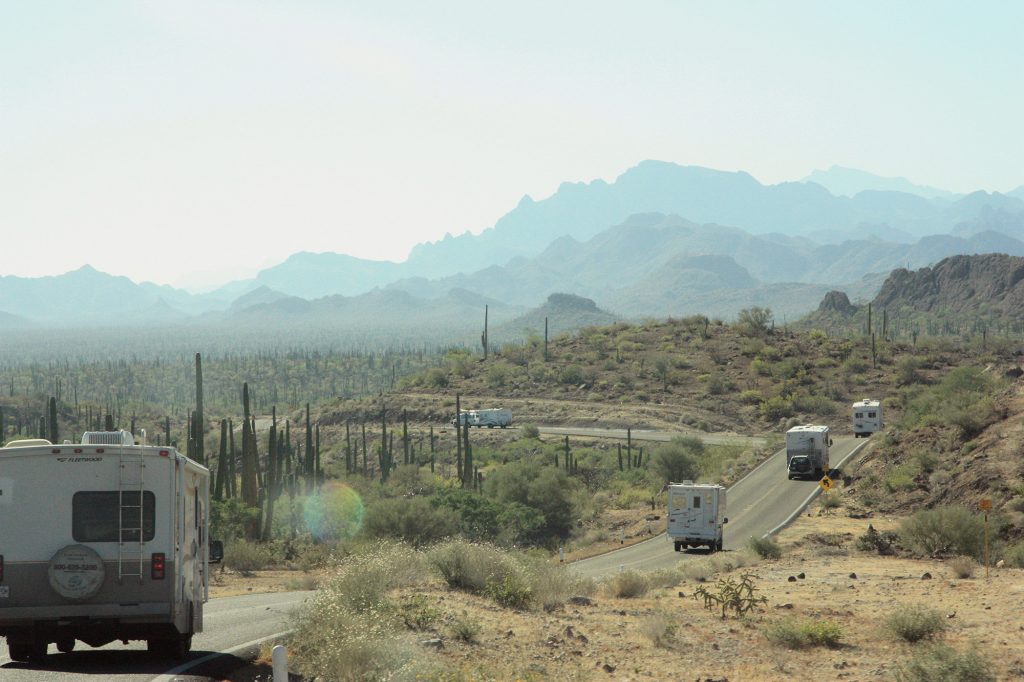 No Night Driving!
No Night Driving!
This is a rule that should be strictly followed on Baja. This is an extremely dangerous practice and it is not because of Banditos! Animals come to the roads at night for the warmth and greenery on the edge. Outside of town there are no street lights, it is really dark. Remember these are roads you are not familiar with.
Have you Heard of the Green Angels?
This is Mexico’s Roadside Assistance who patrol Mex 1 on a regular basis. We know breakdowns do happen! The Government operated Green Angels travel the entire length of Baja twice a day, once in the morning then again in the afternoon.
The Mexican government maintains a large fleet of these green vehicles across Mexico’s major highways on the lookout for travelers and tourists alike that have broken down. In many ways this is very similar to the service offered by BCAA or AAA. They normally travel in pairs and on the Baja speak some English. They are in radio communication with their base and can call for a tow. The service is free except any supplies you might use. In the event you use their service please provide a tip!
What About Fuel?
PEMEX is the gas station of choice for both gas and diesel as they are the only company (government owned) selling these products. This is a cash transaction (pesos or US dollars); however receipts are available on request. Normally this is a full serve experience and we recommend you do not leave your vehicle when the attendant is filling. Paying in US $ means you are paying more.
Where Should we Camp?
There are many full service and partial hook-up RV parks which include hot showers, flush toilets and laundry. Most have WIFI; some parks have pools and small restaurants. Often they are somewhat rustic compared to the RV Parks available in the US or Canada, but remember they are half to a third the price.
Rule number 2; NEVER, NEVER, NEVER CAMP ALONE! Any incidents we have ever heard of (count on one hand) always involve people camping alone, on a beach, in the middle of nowhere. Travelling in pairs always eliminates this or simply camp with others.
El Requeson is the 10th of 12 camping beaches on Bahia Concepcion and a favourite for many RVers. This is a short sand spit which connects a small island to the mainland at low tide, very picturesque indeed. Only pit toilets, nothing else. Vagabundos del Mar Trailer Park in Cabo San Lucas is very popular and one of our favourites.
This is a full service RV park that includes laundry, 2 washrooms and Hot Showers, a heated swimming pool, an excellent Restaurant, walking distance to Cabo San Lucas, close to everything.
What About the water?
This is the second most commonly asked question about RV’ing in Mexico. Although Baja has aquifers across the entire peninsula, purified water is available everywhere from Mini-Supers to Purified Water Outlets designed specifically to refill your water bottles.
What About our Pets?
You must ensure you have all pet shots up to date with papers. Although it is doubtful anyone will check on the way into Mexico, the American Border Services may check as you re-enter the US. Pet food availability is good; however not all brands! You should know that only “made in USA” dry food is permitted across the US Border when you return north.
What to do on Baja?
Where do we start? You can touch Grey Whales in Scammon’s Lagoon in Guerrero Negro , Malarrimo provides an excellent Eco-Tour. Visit the stunning 2nd oldest Mission in all of the Californias’ 35 km from Loreto in San Javier. Tour the historic “Hotel California” made famous by the Rock Band “Eagles” in Todos Santos. The list is truly endless!
We believe no matter what method you choose for your Baja adventure it is well worth it! We promise this magnificent peninsula is far more than just a spectacular RV destination, for many it is a life changing journey that you are likely to repeat for years to come.
For more information, please contact Dan and Lisa Goy at Baja Amigos RV Caravan Tours, 1-866-999-BAJA (2252), e-mail info@bajaamigos.net or visit http://bajaamigos.net/







